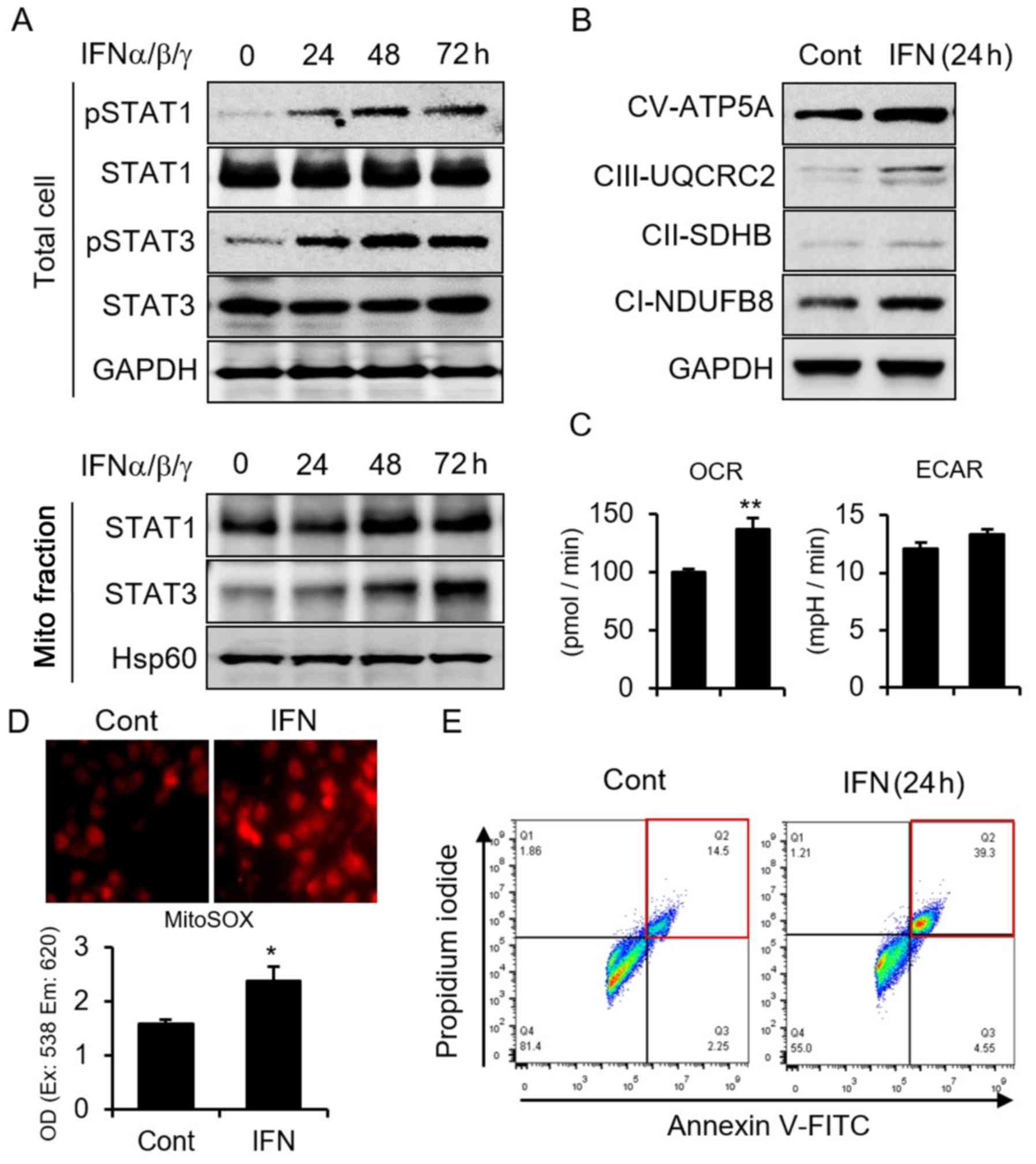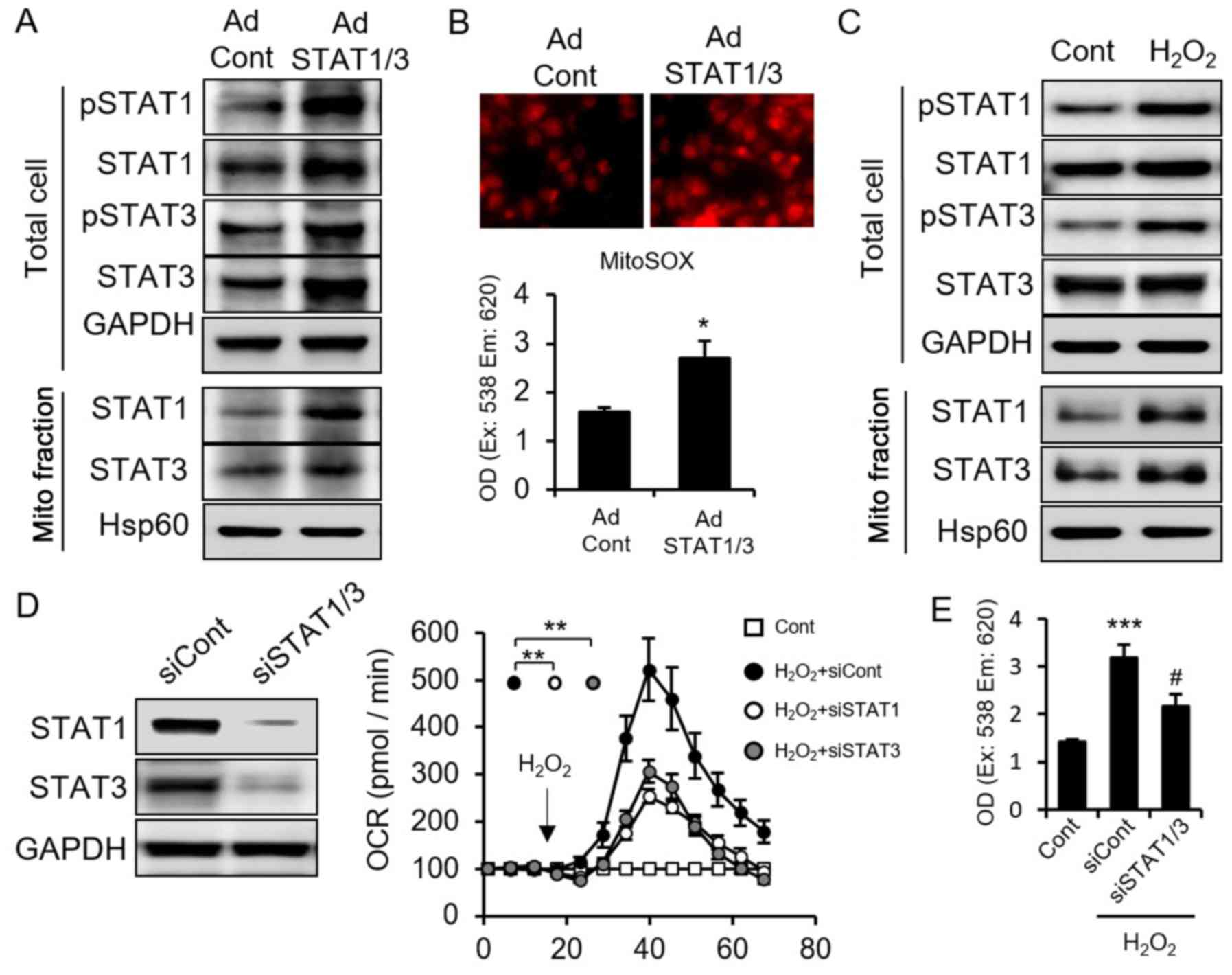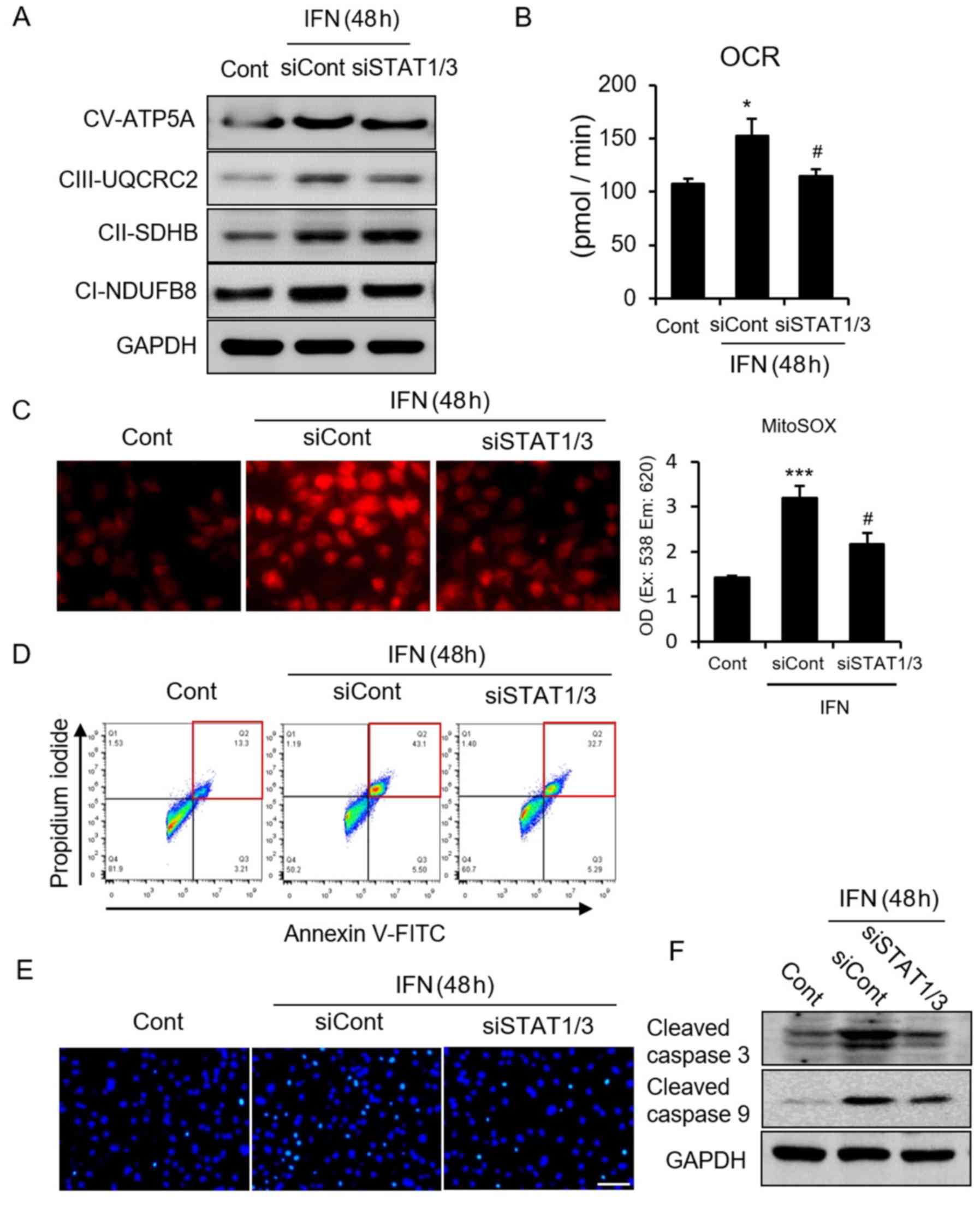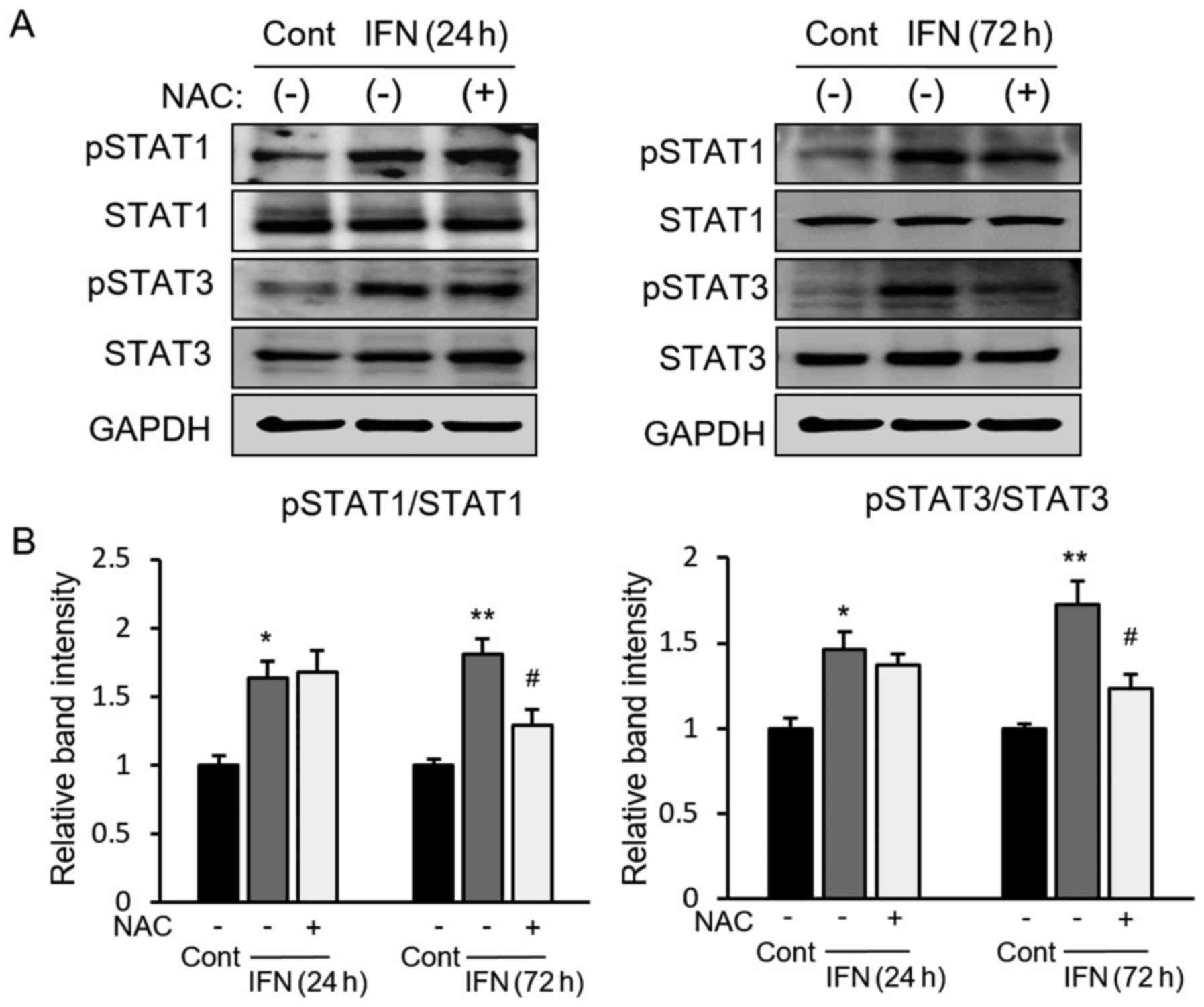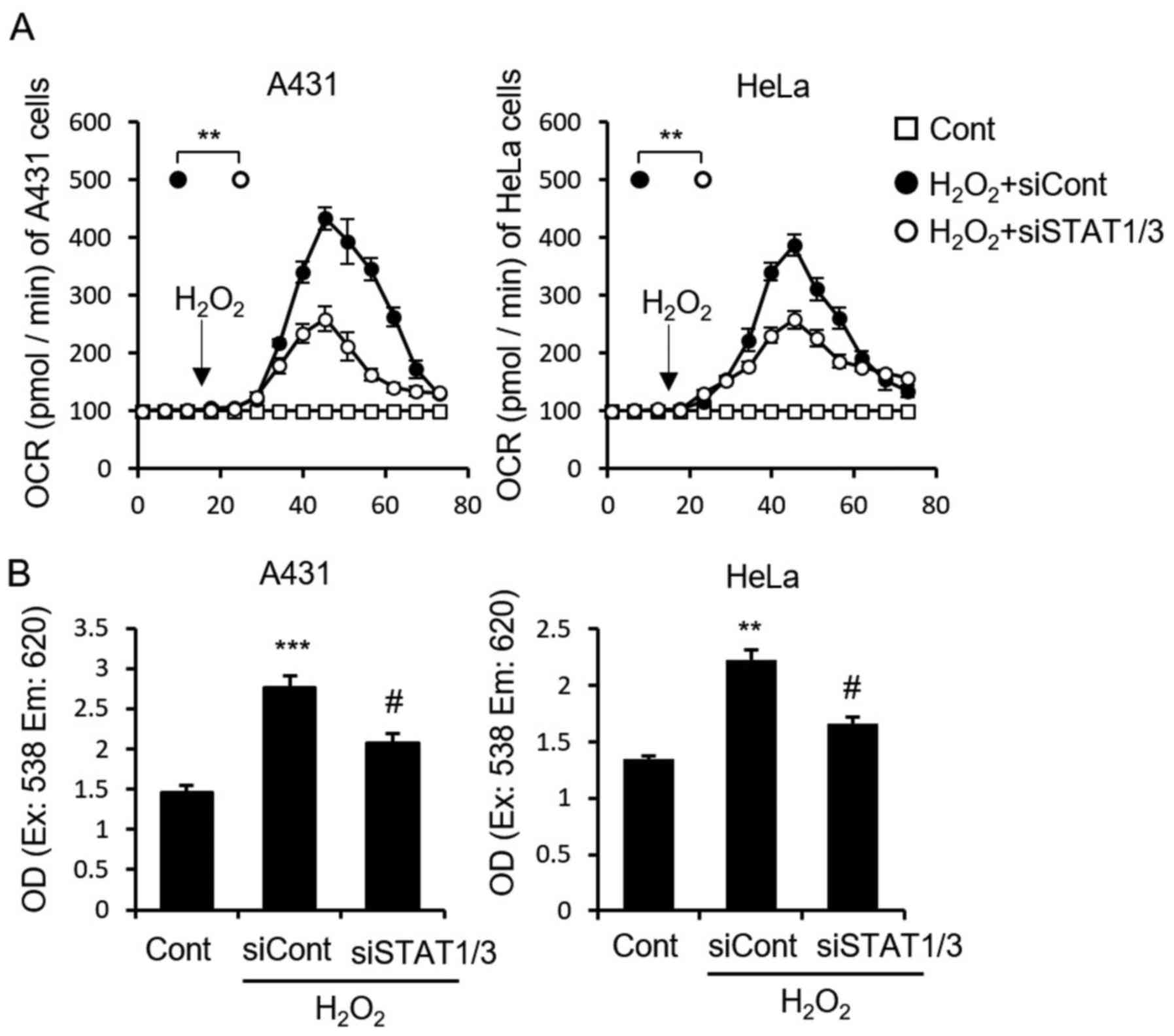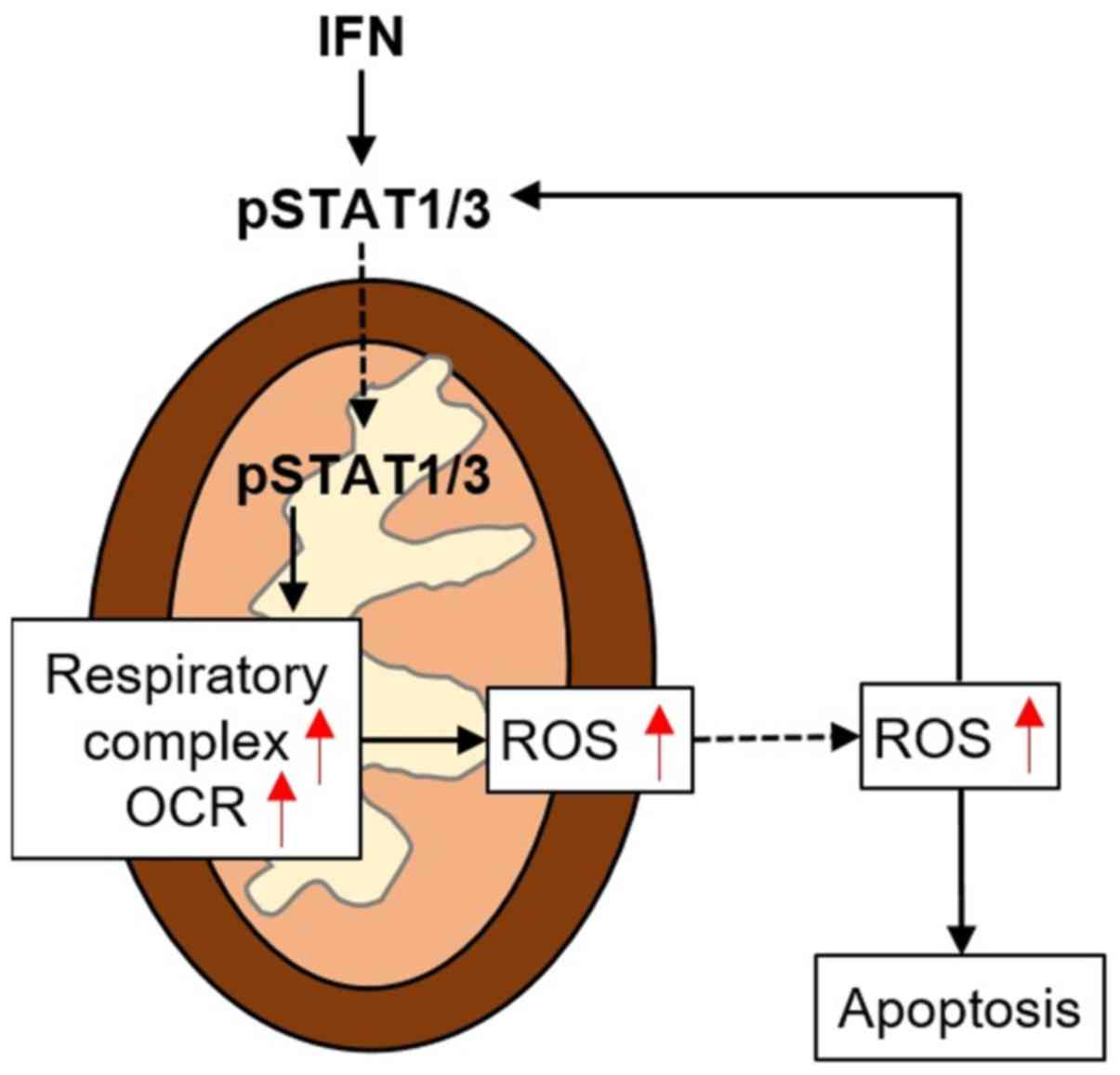|
1
|
Arbuthnot P, Capovilla A and Kew M:
Putative role of hepatitis B virus X protein in
hepatocarcinogenesis: Effects on apoptosis, DNA repair,
mitogen-activated protein kinase and JAK/STAT pathways. J
Gastroenterol Hepatol. 15:357–368. 2000. View Article : Google Scholar : PubMed/NCBI
|
|
2
|
Beebe K, Lee WC and Micchelli CA: JAK/STAT
signaling coordinates stem cell proliferation and multilineage
differentiation in the Drosophila intestinal stem cell lineage. Dev
Biol. 338:28–37. 2010. View Article : Google Scholar
|
|
3
|
Steelman LS, Pohnert SC, Shelton JG,
Franklin RA, Bertrand FE and McCubrey JA: JAK/STAT, Raf/MEK/ERK,
PI3K/Akt and BCR-ABL in cell cycle progression and leukemogenesis.
Leukemia. 18:189–218. 2004. View Article : Google Scholar : PubMed/NCBI
|
|
4
|
Aaronson DS and Horvath CM: A road map for
those who don't know JAK-STAT. Science. 296:1653–1655. 2002.
View Article : Google Scholar : PubMed/NCBI
|
|
5
|
Schindler C and Darnell JE Jr:
Transcriptional responses to polypeptide ligands: The JAK-STAT
pathway. Annu Rev Biochem. 64:621–651. 1995. View Article : Google Scholar : PubMed/NCBI
|
|
6
|
Yuan ZL, Guan YJ, Chatterjee D and Chin
YE: Stat3 dimerization regulated by reversible acetylation of a
single lysine residue. Science. 307:269–273. 2005. View Article : Google Scholar : PubMed/NCBI
|
|
7
|
Xie Y, Kole S, Precht P, Pazin MJ and
Bernier M: S-glutathionylation impairs signal transducer and
activator of transcription 3 activation and signaling.
Endocrinology. 150:1122–1131. 2009. View Article : Google Scholar :
|
|
8
|
Ray S, Boldogh I and Brasier AR: STAT3
NH2-terminal acetylation is activated by the hepatic acute-phase
response and required for IL-6 induction of angiotensinogen.
Gastroenterology. 129:1616–1632. 2005. View Article : Google Scholar : PubMed/NCBI
|
|
9
|
Horvath CM: The Jak-STAT pathway
stimulated by interleukin 6. Sci STKE. 2004:tr92004.PubMed/NCBI
|
|
10
|
Leonard WJ: Role of Jak kinases and STATs
in cytokine signal transduction. Int J Hematol. 73:271–277. 2001.
View Article : Google Scholar : PubMed/NCBI
|
|
11
|
Levy JB, Schindler C, Raz R, Levy DE,
Baron R and Horowitz MC: Activation of the JAK-STAT signal
transduction pathway by oncostatin-M cultured human and mouse
osteoblastic cells. Endocrinology. 137:1159–1165. 1996. View Article : Google Scholar : PubMed/NCBI
|
|
12
|
Lufei C, Ma J, Huang G, Zhang T,
Novotny-Diermayr V, Ong CT and Cao X: GRIM-19, a death-regulatory
gene product, suppresses Stat3 activity via functional interaction.
EMBO J. 22:1325–1335. 2003. View Article : Google Scholar : PubMed/NCBI
|
|
13
|
Tamminen P, Anugula C, Mohammed F,
Anjaneyulu M, Larner AC and Sepuri NB: The import of the
transcription factor STAT3 into mitochondria depends on GRIM-19, a
component of the electron transport chain. J Biol Chem.
288:4723–4732. 2013. View Article : Google Scholar
|
|
14
|
Lee HJ, Oh YK, Rhee M, Lim JY, Hwang JY,
Park YS, Kwon Y, Choi KH, Jo I, Park SI, et al: The role of
STAT1/IRF-1 on synergistic ROS production and loss of mitochondrial
transmembrane potential during hepatic cell death induced by
LPS/d-GalN. J Mol Biol. 369:967–984. 2007. View Article : Google Scholar : PubMed/NCBI
|
|
15
|
Wegrzyn J, Potla R, Chwae YJ, Sepuri NB,
Zhang Q, Koeck T, Derecka M, Szczepanek K, Szelag M, Gornicka A, et
al: Function of mitochondrial Stat3 in cellular respiration.
Science. 323:793–797. 2009. View Article : Google Scholar : PubMed/NCBI
|
|
16
|
Chen Q, Vazquez EJ, Moghaddas S, Hoppel CL
and Lesnefsky EJ: Production of reactive oxygen species by
mitochondria: Central role of complex III. J Biol Chem.
278:36027–36031. 2003. View Article : Google Scholar : PubMed/NCBI
|
|
17
|
Batandier C, Guigas B, Detaille D, El-Mir
MY, Fontaine E, Rigoulet M and Leverve XM: The ROS production
induced by a reverse-electron flux at respiratory-chain complex 1
is hampered by metformin. J Bioenerg Biomembr. 38:33–42. 2006.
View Article : Google Scholar : PubMed/NCBI
|
|
18
|
Kim HS, Cho IH, Kim JE, Shin YJ, Jeon JH,
Kim Y, Yang YM, Lee KH, Lee JW, Lee WJ, et al: Ethyl pyruvate has
an anti-inflammatory effect by inhibiting ROS-dependent STAT
signaling in activated microglia. Free Radic Biol Med. 45:950–963.
2008. View Article : Google Scholar : PubMed/NCBI
|
|
19
|
Liu T, Castro S, Brasier AR, Jamaluddin M,
Garofalo RP and Casola A: Reactive oxygen species mediate
virus-induced STAT activation: Role of tyrosine phosphatases. J
Biol Chem. 279:2461–2469. 2004. View Article : Google Scholar
|
|
20
|
Simon AR, Rai U, Fanburg BL and Cochran
BH: Activation of the JAK-STAT pathway by reactive oxygen species.
Am J Physiol. 275:C1640–C1652. 1998. View Article : Google Scholar : PubMed/NCBI
|
|
21
|
Parkin J and Cohen B: An overview of the
immune system. Lancet. 357:1777–1789. 2001. View Article : Google Scholar : PubMed/NCBI
|
|
22
|
Kiladjian JJ, Giraudier S and Cassinat B:
Interferon-alpha for the therapy of myeloproliferative neoplasms:
Targeting the malignant clone. Leukemia. 30:776–781. 2016.
View Article : Google Scholar
|
|
23
|
Cao ZH, Zheng QY, Li GQ, Hu XB, Feng SL,
Xu GL and Zhang KQ: STAT1-mediated down-regulation of Bcl-2
expression is involved in IFN-γ/TNF-α-induced apoptosis in NIT-1
cells. PLoS One. 10:e01209212015. View Article : Google Scholar
|
|
24
|
Ethiraj P, Veerappan K, Samuel S and
Sivapatham S: Inhibitory effects of interferon-β on hepatocellular
carcinoma HepG2 via Akt/STAT phosphorylation. Fundam Clin
Pharmacol. 29:278–285. 2015. View Article : Google Scholar : PubMed/NCBI
|
|
25
|
Bello C, Vazquez-Blomquist D, Miranda J,
Garcia Y, Novoa LI, Palenzuela D and Bello I: Regulation by
IFN-α/IFN-γ co-formulation (HerberPAG®) of genes
involved in interferon-STAT-pathways and apoptosis in U87MG. Curr
Top Med Chem. 14:351–358. 2014. View Article : Google Scholar
|
|
26
|
Zídek Z, Jansa P and Kmoníčková E:
Activation of respiratory complex II by interferon-gamma and its
inhibition by pyrimidine derivatives. Neuro Endocrinol Lett.
35(Suppl 2): 141–148. 2014.
|
|
27
|
Huang G, Chen Y, Lu H and Cao X: Coupling
mitochondrial respiratory chain to cell death: An essential role of
mitochondrial complex I in the interferon-beta and retinoic
acid-induced cancer cell death. Cell Death Differ. 14:327–337.
2007. View Article : Google Scholar
|
|
28
|
Kim KB, Eton O, East MJ, Hodges C,
Papadopoulos NE, Grimm EA and Bedikian AY: Pilot study of
high-dose, concurrent biochemotherapy for advanced melanoma.
Cancer. 101:596–603. 2004. View Article : Google Scholar : PubMed/NCBI
|
|
29
|
Henry SC, Schmidt EA, Fessler MB and
Taylor GA: Palmitoylation of the immunity related GTPase, Irgm1:
Impact on membrane localization and ability to promote
mitochondrial fission. PLoS One. 9:e950212014. View Article : Google Scholar : PubMed/NCBI
|
|
30
|
Yang JY, Deng W, Chen Y, Fan W, Baldwin
KM, Jope RS, Wallace DC and Wang PH: Impaired translocation and
activation of mitochondrial Akt1 mitigated mitochondrial oxidative
phosphorylation Complex V activity in diabetic myocardium. J Mol
Cell Cardiol. 59:167–175. 2013. View Article : Google Scholar : PubMed/NCBI
|
|
31
|
Tian Z, Miyata K, Kadomatsu T, Horiguchi
H, Fukushima H, Tohyama S, Ujihara Y, Okumura T, Yamaguchi S, Zhao
J, et al: ANGPTL2 activity in cardiac pathologies accelerates heart
failure by perturbing cardiac function and energy metabolism. Nat
Commun. 7:130162016. View Article : Google Scholar : PubMed/NCBI
|
|
32
|
Sansbury BE, Riggs DW, Brainard RE,
Salabei JK, Jones SP and Hill BG: Responses of hypertrophied
myocytes to reactive species: Implications for glycolysis and
electrophile metabolism. Biochem J. 435:519–528. 2011. View Article : Google Scholar : PubMed/NCBI
|
|
33
|
Zorov DB, Juhaszova M and Sollott SJ:
Mitochondrial reactive oxygen species (ROS) and ROS-induced ROS
release. Physiol Rev. 94:909–950. 2014. View Article : Google Scholar : PubMed/NCBI
|
|
34
|
Chin YE, Kitagawa M, Kuida K, Flavell RA
and Fu XY: Activation of the STAT signaling pathway can cause
expression of caspase 1 and apoptosis. Mol Cell Biol. 17:5328–5337.
1997. View Article : Google Scholar : PubMed/NCBI
|
|
35
|
Smith CC, Dixon RA, Wynne AM, Theodorou L,
Ong SG, Subrayan S, Davidson SM, Hausenloy DJ and Yellon DM:
Leptin-induced cardioprotection involves JAK/STAT signaling that
may be linked to the mitochondrial permeability transition pore. Am
J Physiol Heart Circ Physiol. 299:H1265–H1270. 2010. View Article : Google Scholar : PubMed/NCBI
|
|
36
|
Lemoine S, Zhu L, Legallois D, Massetti M,
Manrique A and Hanouz JL: Atorvastatin-induced cardioprotection of
human myocardium is mediated by the inhibition of mitochondrial
permeability transition pore opening via tumor necrosis factor-α
and Janus kinase/signal transducers and activators of transcription
pathway. Anesthesiology. 118:1373–1384. 2013. View Article : Google Scholar : PubMed/NCBI
|
|
37
|
Dvorak K and Dvorak B: Role of
interleukin-6 in Barrett's esophagus pathogenesis. World J
Gastroenterol. 19:2307–2312. 2013. View Article : Google Scholar : PubMed/NCBI
|
|
38
|
Santambrogio P, Erba BG, Campanella A,
Cozzi A, Causarano V, Cremonesi L, Gallì A, Della Porta MG,
Invernizzi R and Levi S: Over-expression of mitochondrial ferritin
affects the JAK2/STAT5 pathway in K562 cells and causes
mitochondrial iron accumulation. Haematologica. 96:1424–1432. 2011.
View Article : Google Scholar : PubMed/NCBI
|
|
39
|
Park SJ1, Lee JH, Kim HY, Choi YH, Park
JS, Suh YH, Park SM, Joe EH and Jou I: Astrocytes, but not
microglia, rapidly sense H2O2 via STAT6
phosphorylation, resulting in cyclooxygenase-2 expression and
prostaglandin release. J Immunol. 188:5132–5141. 2012. View Article : Google Scholar : PubMed/NCBI
|
|
40
|
Jesel M, Isch-Treussard C, Poenaru S and
Isch F: Electromyography in the study of thyrotoxic myopathies. Rev
Electroencephalogr Neurophysiol Clin. 3:183–192. 1973.In French.
View Article : Google Scholar : PubMed/NCBI
|
|
41
|
Sartor CI, Dziubinski ML, Yu CL, Jove R
and Ethier SP: Role of epidermal growth factor receptor and STAT-3
activation in autonomous proliferation of SUM-102PT human breast
cancer cells. Cancer Res. 57:978–987. 1997.PubMed/NCBI
|
|
42
|
Sahu RP and Srivastava SK: The role of
STAT-3 in the induction of apoptosis in pancreatic cancer cells by
benzyl isothiocyanate. J Natl Cancer Inst. 101:176–193. 2009.
View Article : Google Scholar : PubMed/NCBI
|
|
43
|
Thoennissen NH, Iwanski GB, Doan NB,
Okamoto R, Lin P, Abbassi S, Song JH, Yin D, Toh M, Xie WD, et al:
Cucurbitacin B induces apoptosis by inhibition of the JAK/STAT
pathway and potentiates antiproliferative effects of gemcitabine on
pancreatic cancer cells. Cancer Res. 69:5876–5884. 2009. View Article : Google Scholar : PubMed/NCBI
|
|
44
|
Liby K, Voong N, Williams CR, Risingsong
R, Royce DB, Honda T, Gribble GW, Sporn MB and Letterio JJ: The
synthetic triterpenoid CDDO-Imidazolide suppresses STAT
phosphorylation and induces apoptosis in myeloma and lung cancer
cells. Clin Cancer Res. 12:4288–4293. 2006. View Article : Google Scholar : PubMed/NCBI
|
|
45
|
Mora LB, Buettner R, Seigne J, Diaz J,
Ahmad N, Garcia R, Bowman T, Falcone R, Fairclough R, Cantor A, et
al: Constitutive activation of Stat3 in human prostate tumors and
cell lines: Direct inhibition of Stat3 signaling induces apoptosis
of prostate cancer cells. Cancer Res. 62:6659–6666. 2002.PubMed/NCBI
|
|
46
|
Ni Z, Lou W, Leman ES and Gao AC:
Inhibition of constitutively activated Stat3 signaling pathway
suppresses growth of prostate cancer cells. Cancer Res.
60:1225–1228. 2000.PubMed/NCBI
|
|
47
|
Burke WM, Jin X, Lin HJ, Huang M, Liu R,
Reynolds RK and Lin J: Inhibition of constitutively active Stat3
suppresses growth of human ovarian and breast cancer cells.
Oncogene. 20:7925–7934. 2001. View Article : Google Scholar : PubMed/NCBI
|
|
48
|
Bromberg J: Stat proteins and oncogenesis.
J Clin Invest. 109:1139–1142. 2002. View Article : Google Scholar : PubMed/NCBI
|















